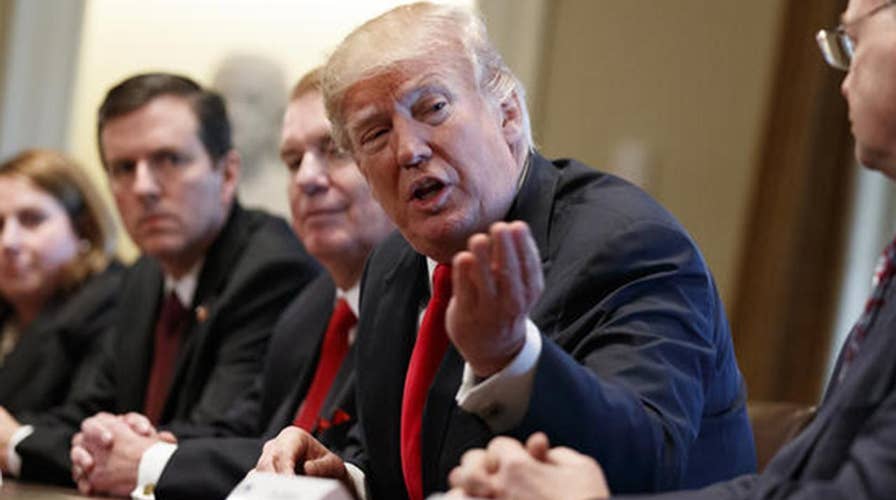President Trump defends tariffs on steel, aluminum imports
'Special Report' All-Star panel on the economic impact of President Trump's agenda.
The resignation Tuesday of National Economic Council Director Gary Cohn is just one of many bad consequences we can expect if President Trump follows through on his plan to impose tariffs of 25 percent on imported steel and 10 percent on imported aluminum.
The president has fired the first shot in a trade war that will hurt America’s relationships with allied nations, harm our national security, weaken our economy and take money out of the wallets of consumers.
According to President Trump, the tariffs he announced last week will be instrumental in rebuilding the American steel and aluminum industries. But many economists and elected officials from both political parties agree that this is a wrongheaded move by the president.
Cohn stepped down as President Trump’s top economic adviser because he understands that while tariffs may help a particular industry for a time, they will harm far more Americans than they will help. He knows that free trade is essential for strong economic growth.
A trade war will hurt America’s relationships with allied nations, harm our national security, weaken our economy and take money out of the wallets of consumers.
Following President Trump’s announcement of his plans to impose tariffs, the negative impact was immediate. The stock market sustained a direct hit and dipped sharply, with especially steep losses in the industrial sector.
American automakers – both U.S. firms and foreign firms that operate U.S. factories – will be especially hard hit if the Trump tariffs take effect, because cars and trucks are built with a lot of steel and aluminum. That means vehicle prices will rise, imported cars will be more competitively price, exports of U.S.-made autos are likely to fall, and American autoworkers will lose their jobs.
A Goldman Sachs analysis found that the added tariffs will cost Ford and General Motors an estimated $1 billion a year, which represents 7 percent of GM’s annual profits and a whopping 12 percent of Ford’s.
These losses will counteract the tariffs’ goal of strengthening the domestic economy and will limit the automakers’ ability to create more American jobs.
In a statement, Ford alluded to such concerns, saying that the tariffs, "could result in an increase in domestic commodity prices harming the competitiveness of American manufacturers."
Even Republican lawmakers agree that President Trump’s tariffs will ultimately harm the American economy and negate growth encouraged by the recently enacted tax cut.
Sen. Ben Sasse, R-Neb., denounced the Trump tariffs, saying: “Let's be clear: The President is proposing a massive tax increase on American families.”
Sasse, a member of the Senate Joint Economic Committee, went on to say: “This is leftist economic policy and we've tried it a whole bunch of times over the last two centuries and every time, American families have suffered.”
Senate Finance Committee Chairman Orrin Hatch, R-Utah, echoed those warnings, calling the tariffs "a tax hike the American people don't need and can't afford."
These tariffs will also affect our relationship with foreign countries, including historic allies. The same Goldman Sachs report noted above said that “by imposing across-the-board tariffs … the larger economic impact is on Canada, Mexico and the EU (European Union), and it ironically eases the economic impact to China and Russia.”
Most distressingly – but predictably – countries that would harmed by the steel and aluminum tariffs have already started discussing retaliatory action.
Canadian Foreign Affairs Minister Chrystia Freeland said: “Should restrictions be imposed on Canadian steel and aluminum products, Canada will take responsive measures to defend its trade interests and workers.”
The European Union, meanwhile, has proposed a 25 percent tariff on American goods such a blue jeans, motorcycles and bourbon whiskey.
Responses like this further amplify the tariffs’ negative consequences. Not only does this policy place financial stress on manufacturers dependent on imported metals; the reaction from other countries will pressure all American exporters and reduce job creation.
For example, American farmers will be hit especially hard if other nations retaliate for our tariffs on steel and aluminum by imposing their own tariffs on American crops.
There is also the threat that Brazil will decrease imports of U.S. metallurgical coal, a key ingredient in the production of steel.
At their current rate of 5.2 million metric tons of metallurgical coal imported each year, the Brazilians are by far the largest foreign consumer of U.S. coal. President Trump’s new tariffs put this critical relationship for American coal producers at risk, even though he has pledged to revive the coal industry.
The president has emphasized that trade wars are “good and easy to win.” However, the risks to our economy, American workers and American consumers are far too great.
A spokeswoman for House Speaker Paul Ryan, R-Wis., admitted: “We are extremely worried about the consequences of a trade war and are urging the White House to not advance with this plan.”
If President Trump goes ahead with plans to impose the tariffs, he runs the risk of congressional Republicans blocking the renewal of trade promotion authority, which gives the power to negotiate trade agreements to the executive branch. The authority expires later this year.
A failure to renew trade promotion authority would be emblematic of serious tension between Republicans in Congress and the White House – a relationship that President Trump must be mindful to maintain if he wants to get legislation passed.
It is imperative then that President Trump heed the advice of Speaker Ryan and Republicans in Congress, as well as economic experts, and abandon his unwise tariff plan. Otherwise, all Americans will pay the price and our nation’s economy will suffer greatly.









































